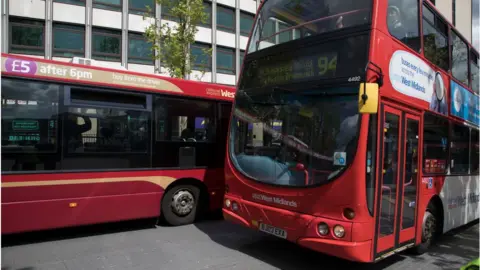More than 130 bus operators to offer £2 tickets
 Getty Images
Getty ImagesMore than 130 bus operators outside London will begin capping single adult fares at £2 next month as part of a government-funded scheme to help people save money.
National Express and Stagecoach will be among those to introduce the cap in England from 1 January to 31 March.
Single local bus fares in England cost £2.80 on average but can exceed £5 in rural areas, the government says.
Labour has said it was a "half measure" after "years of soaring fares".
The cities of Manchester, Liverpool and West Yorkshire - all of which have Labour mayors - have already introduced £2 caps as part of longer-term schemes.
The Department for Transport, which originally announced the scheme in September, said buses were the most popular form of public transport in England, making up half of all journeys.
It said the government was spending £60m on the cap to "help families, students and commuters" while taking "two million car journeys off the road".
According to latest official figures, the number of people travelling by bus has been rising but remains well below pre-Covid levels.
At the same time local bus fares in England were up 4.2% in the three months to 30 June when compared with the same period last year.
The government says the scheme will help the bus industry's recovery, while also enabling passengers to save.
It also said the cap was "an important step" in ensuring passengers got a fair deal.
In a statement on Monday, Go-Ahead said its UK bus operating companies would be capping fares at £2 per single journey from 1 January as part of the scheme.
It said a £2 single fare on one of its bus journeys can you take you 40 miles or further.
Routes covered include the Go North East's X10 between Newcastle and Middlesbrough, which usually costs £8, and the Regency Route between Brighton and Tunbridge Wells, which usually costs £6.20.
The Campaign for Better Transport, a charity, welcomed the cap but said it should be extended.
Spokesman Norman Baker said: "Capping bus fares will help struggling households, cut traffic congestion and carbon emissions, and inject new life into dwindling bus services.
"It's such a win-win that it shouldn't be restricted to three months, but should be extended indefinitely, for the sake of our pockets, our economy and our environment."
